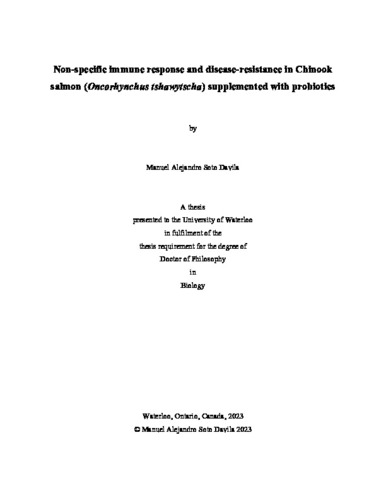| dc.description.abstract | Finfish aquaculture is the fastest-growing food-production sector in the world. Nevertheless, intensive production faces increased disease outbreaks due to high stock densities and environmental effects. Currently, infectious diseases represent the main causes of losses in salmon aquaculture. To prevent this, antibiotics and vaccines have been frequently utilized as a treatment and control methods for infectious agents. However, restrictions on antibiotic use due to antibiotic-resistant strain outbreaks, as well as, the variable protection exerted by vaccines, has made the industry to explore additional treatments. Probiotics are an important non-toxic and non-polluting tool in aquaculture to improve fish growth, stress tolerance and non-specific defense. In finfish aquaculture, many probiotics have been tested, including lactic acid bacteria (LAB; Lactobacillus and Carnobacterium), Bacillus, and Pediococcus spp. The role of probiotics within the digestive tract in the two most important salmonids, Atlantic salmon and rainbow trout, has been widely studied, however the effect of probiotic supplementation on the growth, survival, immune response, and gut integrity of Chinook salmon (Oncorhynchus tshawytscha) raised under aquaculture conditions has not been widely studied.
Chinook salmon is a native species of the Canadian Pacific coast with potential economic and environmental benefits for aquaculture. Additionally, Chinook salmon farming can play an important role in diversifying current Canadian aquaculture and help protecting the wild stocks. Some issues that keep to date Chinook salmon farming at a low scale are the risk of escapees diluting the genetic diversity of wild populations and the decrease of the flesh quality when they reach sexual maturation. Sterile triploid salmon offer a solution however, they have an a 10-30% higher disease mortality rate compared to diploid fish. This makes Chinook salmon an ideal candidate to utilize probiotics as an alternative to antibiotics and vaccines.
The contents of this thesis examine the effect of single-strain and multi-strain probiotics either commercially available or generously donated by companies. Also, this thesis focuses in evaluating probiotic supplementation at different production cycles (freshwater and saltwater), fish size (juveniles and adults), and/or supplementation time (4, 10, 14 months). Since in vivo experiments were conducted once a year, preliminary studies to determine the safety of the strains were carried out in the lab using the salmonid intestinal epithelial cell line derived from rainbow trout (Oncorhynchus mykiss), RTgutGC.
Overall, the results obtained in this thesis demonstrated that probiotic strains utilized in different experiments did not show negative effects in terms of cell viability and/or Chinook salmon tissues (histopathological analysis). Data collected during the in vitro trials demonstrated that probiotic stimulation was able to modulate the expression of TJ and immune genes without impacting the cell viability. For the in vivo trial, the most interesting results associated to fish survival was observed after multi-strain Jamieson® probiotic supplementation throughout the freshwater and saltwater production cycle (14 months of supplementation), showing a decrease of ~10% in the mortality of Chinook salmon challenged with V. anguillarum compared to fish fed regular pellet.
In all the trials conducted for this thesis, it was not possible to obtain an improvement in fish growth parameters (weight and length), as has been observed in previous probiotic supplementation studies. Nevertheless, research conducted for this thesis represents one of few studies that has been able to evaluate probiotic supplementation over a full year of saltwater production in real aquaculture conditions.
The gene expression results suggest that probiotic supplementation can differentially modulate the early inflammatory response and gut barrier function after infection with V. anguillarum, however more studies are still needed to fully understand the correlation between gene expression and the survival and growth data collected in this study.
The resulting data collected from the ELISAs of IgM and IgT provided novel functional information regarding protein levels in different tissues of Chinook salmon. It is important to mention that this study represents the first time that IgT of Chinook salmon has been observed in western blots and the protein levels measured in ELISA, therefore, this thesis would be the primary reference for any future studies evaluating this immunoglobulin in the future.
Overall, these studies demonstrate the importance of investigating the mechanism underlying host-microbe interactions to help improve Chinook salmon aquaculture in an environmentally sustainable manner. | en |

